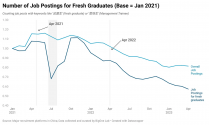Unfortuntaly in the US at least EDA, OS, etc companies can't offer the same level of compensation that Google or Meta could. As a result, top college graduates in the US were funneled into FAANG companies code farming while EDA companies largely hired overseas foreigners in comparison.There are several reasons, but the most important one is that these companies are siphoning scarce resources (STEM talent) and investment away from strategic sectors like semiconductors, EDA, OS, etc. China needs to develop a world-class portfolio of core technologies, it doesn't need more e-commerce sites and food delivery apps.
Some other reasons include their lax data security (putting it mildly), gaming the financial system like Ant and dumping risk on the state-owned banks, and extremely toxic work culture (996).
And it wouldn't surprise me in the slightest if some of these companies got too big for their britches and thought to translate their economic heft into political power. Jack Ma certainly seems stupid enough to try it.
Encouraging people to pursue such fields would require a way to provide a similar level of compensation in comparison to Google or Meta, especially when compensation is viewed as the #1 factor in choosing a starting career. CS used to be quite unpopular until about 10 years ago when FAANG began offering finance-level packages to new grads. Such a compensation adjustment can be accomplished using a variety of tactics, but the important part is to manage the compensation in order to attract and utilize emerging talent.
Striking at large tech companies is one way to encourage talent to flow to desired sectors, although a more coercive one. Keep in mind that if Baba, Tencent, etc offer higher compensation and growth compared to semi companies, young people will flock to join them once the large tech companies began hiring again. The only way to stop this talent drain long term is to make these companies more attractive to work for.FAANG used to hire all the best and brightest college graduates from top universities even if these people never fully utilized by these companies. We have witnessed how Meta fired so many dead-weight without any stress. I won't rule out it is deliberately attempt from these companies to stifle innovation from competitors.
If that were the case, then I won't rule out the central government wanted to weaken Chinese high tech companies from hiring talent without investing in R&D. Many hardware companies such SMIC were able to hire talent much more easily lately due to the job conditions of STEM students as Alibaba, Tencent or Meituan have stopped hiring as much.
Last edited:


